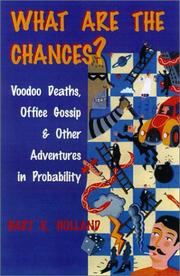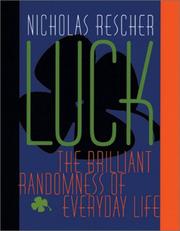| Listing 1 - 10 of 171 | << page >> |
Sort by
|
Book
Year: 2023 Publisher: London : UCL Press,
Abstract | Keywords | Export | Availability | Bookmark
 Loading...
Loading...Choose an application
- Reference Manager
- EndNote
- RefWorks (Direct export to RefWorks)
Beliefs, superstitions and tales about luck are present across all human cultures, according to anthropologists. We are perennially fascinated by luck and by its association with happiness and danger, uncertainty and aspiration. Yet it remains an elusive, ungraspable idea, one that slips and slides over time: all cultures reimagine what luck is and how to tame it at different stages in their history, and the modernity of the 'long twentieth century' is no exception to the rule. Apparently overshadowed by more conceptually tight, scientific and characteristically modern notions such as chance, contingency, probability or randomness, luck nevertheless persists in all its messiness and vitality, used in our everyday language and the subject of studies by everyone from philosophers to psychologists, economists to self-help gurus. Modern Luck sets out to explore the enigma of luck's presence in modernity, examining the hybrid forms it has taken on in the modern imagination, and in particular in the field of modern stories. Indeed, it argues that modern luck is constituted through narrative, through modern luck stories. Analysing a rich and unusually eclectic range of narrative taken from literature, film, music, television and theatre - from Dostoevsky to Philip K. Dick, from Pinocchio to Cimino, from Curtiz to Kieślowski - it lays out first the usages and meanings of the language of luck, and then the key figures, patterns and motifs that govern the stories told about it, from the late nineteenth century to the present day.
Book
ISBN: 1094249637 9700000006974 Year: 2004 Publisher: [Place of publication not identified] : Perlego,
Abstract | Keywords | Export | Availability | Bookmark
 Loading...
Loading...Choose an application
- Reference Manager
- EndNote
- RefWorks (Direct export to RefWorks)
"Tomaso's Fortune and Other Stories" is a collection of short stories by Henry Seton Merriman, published in 1890. The stories are set in various European countries and explore themes of love, betrayal, and redemption. Merriman's masterful use of characterization and descriptive language creates vivid portraits of his characters and their surroundings, making this collection a compelling read for fans of literary fiction.
Fortune. --- Luck --- Opportunity
Book
ISBN: 9781800083592 Year: 2023 Publisher: London : UCL Press,
Abstract | Keywords | Export | Availability | Bookmark
 Loading...
Loading...Choose an application
- Reference Manager
- EndNote
- RefWorks (Direct export to RefWorks)
Beliefs, superstitions and tales about luck are present across all human cultures, according to anthropologists. We are perennially fascinated by luck and by its association with happiness and danger, uncertainty and aspiration. Yet it remains an elusive, ungraspable idea, one that slips and slides over time: all cultures reimagine what luck is and how to tame it at different stages in their history, and the modernity of the 'long twentieth century' is no exception to the rule. Apparently overshadowed by more conceptually tight, scientific and characteristically modern notions such as chance, contingency, probability or randomness, luck nevertheless persists in all its messiness and vitality, used in our everyday language and the subject of studies by everyone from philosophers to psychologists, economists to self-help gurus. Modern Luck sets out to explore the enigma of luck's presence in modernity, examining the hybrid forms it has taken on in the modern imagination, and in particular in the field of modern stories. Indeed, it argues that modern luck is constituted through narrative, through modern luck stories. Analysing a rich and unusually eclectic range of narrative taken from literature, film, music, television and theatre - from Dostoevsky to Philip K. Dick, from Pinocchio to Cimino, from Curtiz to Kieślowski - it lays out first the usages and meanings of the language of luck, and then the key figures, patterns and motifs that govern the stories told about it, from the late nineteenth century to the present day.
Fortune. --- Luck --- Opportunity
Book
Abstract | Keywords | Export | Availability | Bookmark
 Loading...
Loading...Choose an application
- Reference Manager
- EndNote
- RefWorks (Direct export to RefWorks)
Telling Fortunes by Cards is a book by Mohammed Ali. It focuses on divination by cards, also known as cartomancy and presents different aspects related through different cultures practicing it.
Book
ISBN: 9004429557 Year: 2020 Publisher: Leiden, The Netherlands ; Boston : Brill,
Abstract | Keywords | Export | Availability | Bookmark
 Loading...
Loading...Choose an application
- Reference Manager
- EndNote
- RefWorks (Direct export to RefWorks)
In Physiognomy in Ming China: Fortune and the Body , Xing Wang investigates the intellectual and technical contexts in which the knowledge of physiognomy ( xiangshu ) was produced and transformed in Ming China (1368-1644 C.E.). Known as a fortune-telling technique via examining the human body and material objects, Xing Wang shows how the construction of the physiognomic body in many Ming texts represent a unique, unprecedented ‘somatic cosmology’. Applying an anthropological reading to these texts and providing detailed analysis of this technique, the author proves that this physiognomic cosmology in Ming China emerged as a part of a new body discourse which differs from the modern scholarly discourse on the body.

ISBN: 0801875927 9780801875922 9780801869419 0801869412 Year: 2002 Publisher: Baltimore Johns Hopkins University Press
Abstract | Keywords | Export | Availability | Bookmark
 Loading...
Loading...Choose an application
- Reference Manager
- EndNote
- RefWorks (Direct export to RefWorks)
Whether you have only a distant recollection of high school algebra or use differential equations every day, this book offers examples of the impact of chance that will amuse and astonish.
Probabilities --- Chance --- Fortune --- Necessity (Philosophy)
Book
Year: 2006 Publisher: [Place of publication not identified] : Project Gutenberg,
Abstract | Keywords | Export | Availability | Bookmark
 Loading...
Loading...Choose an application
- Reference Manager
- EndNote
- RefWorks (Direct export to RefWorks)
Book
Year: 2017 Publisher: Project Gutenberg
Abstract | Keywords | Export | Availability | Bookmark
Book
ISBN: 0190453915 0190267534 1283427729 9786613427724 0199876673 9780199876679 0199742987 9780199742981 9781283427722 9780190267537 9780199742981 9780190453916 6613427721 Year: 2012 Publisher: Oxford Oxford University Press
Abstract | Keywords | Export | Availability | Bookmark
 Loading...
Loading...Choose an application
- Reference Manager
- EndNote
- RefWorks (Direct export to RefWorks)
In this collection of essays -- a follow up to My Way and Our Stories -- John Martin Fischer defends the contention that moral responsibility is associated with ""deep control"". Fischer defines deep control as the middle ground between two untenable extreme positions: ""superficial control"" and ""total control"". Our freedom consists of the power to add to the given past, holding fixed the laws of nature, and therefore, Fischer contends, we must be able to interpret our actions as extensions of a line that represents the actual past. In ""connecting the dots"", we engage in a distinctive sor

ISBN: 0822957558 1322096414 0822972271 9780822972273 9780822957553 Year: 1995 Publisher: Pittsburgh, Pennsylvania : University of Pittsburgh Press,
Abstract | Keywords | Export | Availability | Bookmark
 Loading...
Loading...Choose an application
- Reference Manager
- EndNote
- RefWorks (Direct export to RefWorks)
Annotation
Chance. --- Fortune. --- Fate and fatalism. --- Destiny --- Fatalism --- Fortune --- Philosophy --- Necessity (Philosophy) --- Luck --- Opportunity --- Probabilities
| Listing 1 - 10 of 171 | << page >> |
Sort by
|

 Search
Search Feedback
Feedback About UniCat
About UniCat  Help
Help News
News